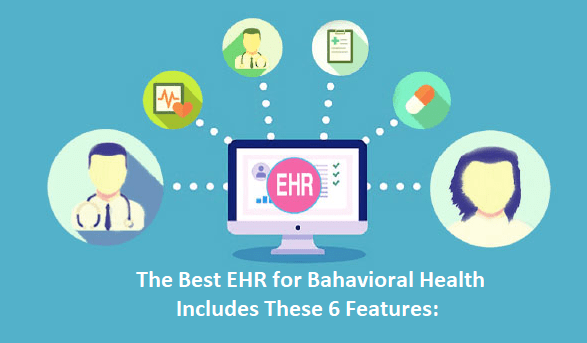As behavioral health professionals, we want what’s best for our patients. When it comes to electronic health records (EHRs), what’s best for our patients is often something that they may not interact with every day.
This behind-the-scenes player has become a powerhouse in the medical, behavioral health, addiction treatment, and human services fields. Now, it’s an indispensable software tool that helps organizations run better and more efficiently.
EHR software designed specifically for behavioral health treatment can change your life and the lives of your patients. The wrong EHR, however, can have a negative impact on workflows, effective time management, employee satisfaction, best practices, funding and finances, and most importantly, the patient.
When looking for an EHR for your behavioral health organization, there are many critical features that you should seek out. As a result, we’ve identified and explored the six most important EHR features for behavioral health providers:
- Clinical Features
- Medical Features
- Financial Features
- Operational Features
- Outcomes Features
- Engagement Features
1) EHR Software Clinical Features
Having the right lineup of clinical features is essential to getting the best out of your EHR software. Be sure to look for an EHR with the following:
Documentation Suite
All EHRs have some version of a documentation suite, but some are more functional and efficient than others. Specialized documentation tools, such as auto-population and intuitive logic that guides the user through the documentation process, is the kind of functionality you want.
Be mindful if an EHR delivers a single solution that shares mission critical information across the entire enterprise in real-time. This feature is a must, providing intelligent and seamless support at the time of decision.
Dashboard
A dashboard is a valuable data visualization tool. You deserve an EHR with intelligently designed reporting consoles that allow clinicians to utilize visualization of a given patient based on multiple treatment factors.
A good dashboard will also allow you access to composite scoring and other tools that deliver decision support capabilities – all at a glance, all right on your dashboard.
.jpg)
Care Coordination
Care coordination features organize and automate valuable material for clinical uses.
Care coordination tools can help providers manage their clients, contacts, and alumni within a single software platform. Automated workflow, system alerts, and notifications enable treatment team members to follow and or be alerted based on specified criteria.
Mobility
Mobile software that offers secure, remote access to an EHR is essentially a requirement in this day and age.
A mobile-enabled EHR breeds efficiency at any operation. For example, clinicians should be able to access patient charts from a mobile device or tablet to adjust to an increasingly digital industry. Or, the front desk should be able to admit patients using tablets to expedite the process.
In this way, EHR mobility enhances the user experience and improves treatment outcomes.
2) EHR Software Medical Features:
EHRs designed for behavioral health will take into consideration essential medical features. Mobility and a solid documentation suite are essential here, in addition to:
Order Management
Medications, lab orders, results, patient vital signs, and so much more – you have a lot to keep track of for each patient you see.
Simplify all of it while reducing your risk of human error with a stellar order management tool. EHRs designed for behavioral health will help you and your staff easily manage a wide range of data points, such as:
- Medications
- Lab orders and results
- Caloric intake
- Vital signs
Ideally, all of this can be done in a centralized suite designed specifically for inpatient medical teams. In quality EHRs, all of these tasks can be performed directly from one screen. Thus, comprehensive order management tools save you time and reduce the chance for user error.
Care Coordination
Your patients are valuable, and so is your time. The best EHR software for behavioral health will include intelligent care coordination tools.
These support instant messaging, secure messaging, and other forms of alerts and notifications. Care coordination helps you make sure your treatment team members are empowered to be alerted based on specified criteria.
3) EHR Software Financial Features
You can’t help your patients if your facility doesn’t manage its financial resources responsibly. A quality EHR will offer features that help you with billing, reporting, and more.
Revenue Cycle Management
Your EHR should include both revenue cycle management (RCM) and billing features. This enables you to use one software solution to effectively and efficiently manage a complete continuum of care.
You can electronically maintain and track third-party financial agreements including address, contact information, contracted rates, and co-pays for treatment services.
A dynamic RCM platform will give you access to funding source information, including:
- Self-pay and insurance information
- Rates
- Required claim form type
- Benefits information
- Payer authorization management info
.jpg)
Real-Time Solutions
Look for a billing module that enables you to track claims in real-time. This should also include real-time visualizations of year-to-year performance reports with just the click of a mouse.
Efficiency
With the right EHR, it is entirely possible to get paid and track your finances with efficiency and synergy. Important financial features include:
- Complete clearinghouse integration with Claim Status tracking and 835 Electronic Remittance processing
- Intuitively execute waterfall billing and other specialized billing functions
- Leverage a complete record of all payment received including source, payee, invoice, balance, write-off amount and designated GL Accounts
- Utilize built-in dashboards, analytics, and system reports to better track and control your financial operations and service delivery
- Identify operational and financial trends and respond proactively
- Implement and manage organizationally defined Key Performance Indicators
4) Operational Features
EHRs don’t do any good if your providers and staff are too frustrated with the platform to use them. EHRs designed for behavioral health treatment should feel intuitive to end users, thus facilitating their tasks.
Important operational features to look for are:
Dynamic Workflow Engine
Your EHR’s workflow engine should be built with your staff in mind.
Powerful EHRs can take complex workflows across your Intake, Clinical, Medical, Operational and Administrative sides and intelligently automate a synergistic process between them all.
Effective workflows make your facility more efficient, which in turn allow you to focus on patient care.
.png)
Staff, Facility, and Accreditation Management
In behavioral health treatment, your EHR software should be able to track:
- Credentials
- Supervision logs
- Work orders
- W2 information
- Staff assessments
- Track staff training
As far as accreditation, your software should keep you up to date JCAHO and CARF audits and requirements.
5) EHR Software Outcomes Features
Get the most out of your hard work by getting an EHR that helps you track and analyze outcomes.
Data Collection
Find an EHR that offers:
- Simple data capture for all end users
- Comprehensive Golden-Thread data sharing
- Analytics for outcome measurements and key performance indicator reporting.
Analytics
Providers in the behavioral health space need a platform that allows them to report on and analyze specific data.
As a result, look for an EHR that offers built-in dashboards, data trending within the system, and exportable reports for further research and queries.
6) EHR Software Engagement Features
Improve your patient experience by leveraging patient engagement solutions to engage before, during, and after treatment.
A good deal of patient engagement takes place outside of the office via a patient portal.
As far as engagement goes in behavioral health, you want an EHR that is capable of:
- Online communication without the delays of ground mail, missed phone calls or misinterpreted voice messages
- On demand patient access to information
- Administration of surveys, checklists and questionnaires
- Ability to publish content and manage appointments
- Secure communication with patients through text and email options
- Ability to post questionnaires and manage ongoing evaluations tools
- Online tools for patients to pay off balances as well as view statements.
.png)
Finding the Right EHR For Your Behavioral Health Organization
We appreciate that we’ve just thrown a lot of information at you.
However, choosing the right EHR software for your operation is a huge decision. You should try to be as educated as possible before you start shopping and demoing software solutions.
To assist you in that education, we put together an article that can help guide you in your EHR decision. This article, How To Choose The Right EHR Vendor, is a great resource to combine with your new knowledge of the EHR features you need. Click the link to see how you can evaluate individual EHR vendors outside of their EHR offerings!



